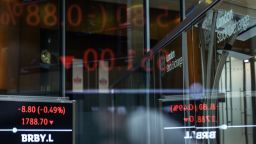A slowdown in global initial public offerings continued in the first quarter of 2023 and is likely to endure in the coming months, as companies wait out the effects of volatile stock markets, higher interest rates and inflation, and uncertainty around the banking crisis.
That’s according to an EY report Thursday, which found that 299 companies around the world went public over the past three months, down 8% compared to the same time last year. Funds raised from those listings, meanwhile, plummeted 61% year-on-year, to $21.5 billion.
The slump follows a 45% drop in the number of IPOs last year, according to EY.
“Through just one quarter of 2023, it was more of the same for the stuttering global IPO market,” the firm said in a statement Thursday.
“Any initial euphoria at the start of the year was quickly dampened by the unexpected inflation and interest rate outlook, with the mood further stifled by the latest turmoil in the global banking system.”
Investors have been grappling with higher interest rates and costs of living for months. Lately, they’ve also been unnerved by historic upheaval in the banking industry, which has resulted in emergency interventions for Credit Suisse, Silicon Valley Bank, Signature Bank and First Republic Bank.
Ultimately, this means “companies are holding out for the stock markets to stabilize and rebound before listing,” EY said in its report.
Ringo Choi, EY’s IPO leader for Asia Pacific — a region that saw a dip in listings this quarter — said there was a “backlog” of firms that were interested in going public.
In Mainland China, for example, there are some “800 companies in the pipeline,” according to Choi, citing public filings.
But many firms around the world are biding their time, particularly as they’re discouraged by a lack of returns for those that did hit the market in recent months, he told CNN.
“Most of them report a loss,” Choi said. “People start to worry [and say,] ‘Well, what’s the meaning for getting an IPO?’ Why don’t they wait?”
Choi said he expects the decline to persist until at least the summer. But things may turn around later this year as “peaking inflation, energy prices softening and the rebound of mainland China’s economy” help investors regain confidence, according to EY.
Choi predicted the global market would recover in the second half of 2023, in part because he believed it had already hit the bottom.
“We’re lying on the floor,” he said. “It is very easy for us to have a rebound.”
Governments around the world are trying to promote IPOs in their respective jurisdictions, which could spur a revival, Choi noted.
Hong Kong’s Chief Executive John Lee, for example, recently traveled to Saudi Arabia and urged companies to consider listing in the city, Choi said.
“Once there is evidence of a more stable market with higher certainty, investor confidence should return,” EY said in its statement.
The firm indicated that “prominent companies that had postponed IPO plans may restart, albeit at more modest valuations.”










